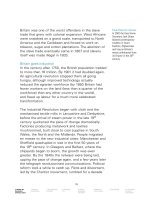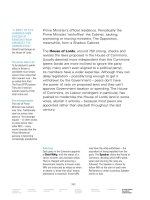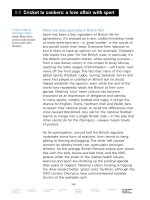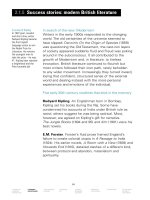Speak the culture britain be fluent in b 43
Bạn đang xem bản rút gọn của tài liệu. Xem và tải ngay bản đầy đủ của tài liệu tại đây (33.88 KB, 1 trang )
Britain was one of the worst offenders in the slave
trade that grew with colonial expansion. West Africans
were snatched on a grand scale, transported to North
America and the Caribbean and forced to work on
tobacco, sugar and cotton plantations. The abolition of
the slave trade eventually came in 1807 and slavery
itself was made illegal in 1833.
Final Straw for colonies
In 2002 the then Home
Secretary Jack Straw
blamed contemporary
troubles in Israel,
Kashmir, Afghanistan
and Iraq on Britain’s
messy withdrawal from
its Empire in the 20th
century.
Britain goes industrial
In the century after 1750, the British population trebled
to more than 16 million. By 1901 it had doubled again.
An agricultural revolution stopped them all going
hungry, although improved technology actually
reduced the agrarian workforce (by 1850 Britain had
fewer workers on the land (less than a quarter of the
workforce) than any other country in the world),
and freed up labour for a much more celebrated
transformation.
The Industrial Revolution began with cloth and the
mechanised textile mills in Lancashire and Derbyshire,
before the arrival of steam power in the late 19th
century quickened the pace of change dramatically.
Factories producing metalwork and textiles
mushroomed, built close to coal supplies in South
Wales, the North and the Midlands. People migrated
en masse to the new industrial cities: Manchester and
Sheffield quadrupled in size in the first 50 years of
the 19th century. In Glasgow and Belfast, where the
shipyards began to boom, the growth was even
greater. By the 1840s the railways were being laid,
upping the pace of change again, and a few years later
the telegraph revolutionised communications. Political
reform took a while to catch up. Riots and discontent,
led by the Chartist movement, rumbled for a decade
33
1. Identity: the
foundations
of British culture
2. Literature
and philosophy
3. Art, architecture
and design
4. Performing
arts
5. Cinema,
photography
and fashion
6. Media and
communications
7. Food and drink
8. Living culture:
the state of
modern Britain









